word完整版现在完成时与现在完成进行时态讲解及练习含答案推荐文档
现在完成时与现在完成进行时态讲解及练习(含答案)
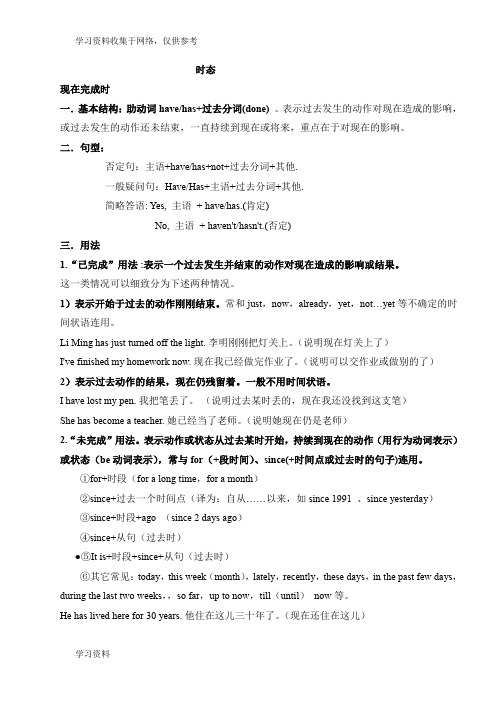
时态现在完成时一.基本结构:助动词have/has+过去分词(done) 。
表示过去发生的动作对现在造成的影响,或过去发生的动作还未结束,一直持续到现在或将来,重点在于对现在的影响。
二.句型:否定句:主语+have/has+not+过去分词+其他.一般疑问句:Have/Has+主语+过去分词+其他.简略答语: Yes, 主语+ have/has.(肯定)No, 主语+ haven't/hasn't.(否定)三.用法1.“已完成”用法 :表示一个过去发生并结束的动作对现在造成的影响或结果。
这一类情况可以细致分为下述两种情况。
1)表示开始于过去的动作刚刚结束。
常和just,now,already,yet,not…yet等不确定的时间状语连用。
Li Ming has just turned off the light. 李明刚刚把灯关上。
(说明现在灯关上了)I've finished my homework now. 现在我已经做完作业了。
(说明可以交作业或做别的了)2)表示过去动作的结果,现在仍残留着。
一般不用时间状语。
I have lost my pen. 我把笔丢了。
(说明过去某时丢的,现在我还没找到这支笔)She has become a teacher. 她已经当了老师。
(说明她现在仍是老师)2.“未完成”用法。
表示动作或状态从过去某时开始,持续到现在的动作(用行为动词表示)或状态(be动词表示),常与for(+段时间)、since(+时间点或过去时的句子)连用。
①for+时段(for a long time,for a month)②since+过去一个时间点(译为:自从……以来,如since 1991 、since yesterday)③since+时段+ago (since 2 days ago)④since+从句(过去时)●⑤It is+时段+since+从句(过去时)⑥其它常见:today,this week(month),lately,recently,these days,in the past few days,during the last two weeks,,so far,up to now,till(until)now等。
现在完成时讲解及练习题(含答案)[1]
![现在完成时讲解及练习题(含答案)[1]](https://img.taocdn.com/s3/m/0132335bfd0a79563d1e72d7.png)
现在完成时讲解及练习题(含答案)(word版可编辑修改)编辑整理:尊敬的读者朋友们:这里是精品文档编辑中心,本文档内容是由我和我的同事精心编辑整理后发布的,发布之前我们对文中内容进行仔细校对,但是难免会有疏漏的地方,但是任然希望(现在完成时讲解及练习题(含答案)(word版可编辑修改))的内容能够给您的工作和学习带来便利。
同时也真诚的希望收到您的建议和反馈,这将是我们进步的源泉,前进的动力。
本文可编辑可修改,如果觉得对您有帮助请收藏以便随时查阅,最后祝您生活愉快业绩进步,以下为现在完成时讲解及练习题(含答案)(word版可编辑修改)的全部内容。
时态讲解:现在完成时(1)构成:现在完成时由助动词have + 过去分词构成,助动词have 有人称和数的变化.第三人称单数用has,其余用have.现在完成时的否定式直接在助动词后面加上not、疑问式是把助动词提到主语之前。
以study 为例,其否定式、疑问式和简单回答形式如下:(2)用法:1)现在完成时通常表示在说话之前已经完成的动作或存在的状态。
说话人强调的是该动作或状态对现在的结果或影响.My daughter has just gone out. 我女儿刚出去。
I’m sure we’ve met before。
我肯定我们以前见过面。
She has arrived。
她到了。
2)表示持续到现在的动作或状态,往往和包括现在在内的表示一段时间的状语连用,如recently, already, just, lately,for…, since…,yet等。
如:I haven’t heard from her these days。
这些日子我没有收到她的信。
We haven’tseen you recently。
最近我们没有见到你。
They have been away for two years。
他们离开已经两年了。
She has been withus since Monday。
(完整word版)现在完成时态讲解及练习
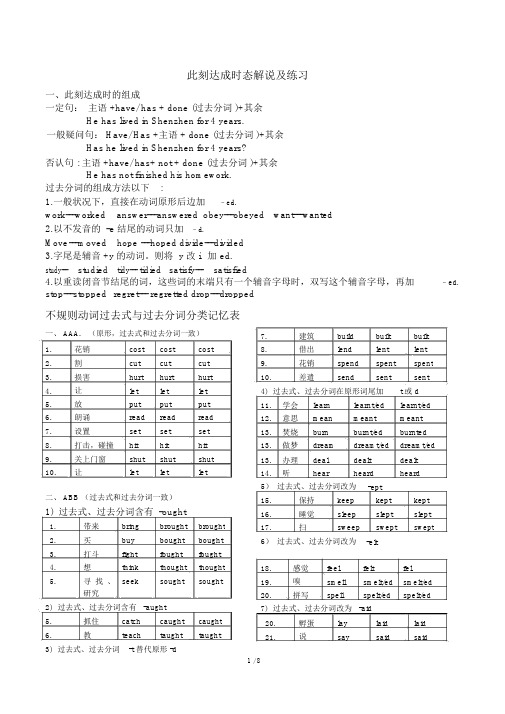
此刻达成时态解说及练习一、此刻达成时的组成一定句:主语 +have/ has + done (过去分词 )+其余He has lived in Shenzhen for 4 years.一般疑问句: Have/ Has +主语 + done (过去分词 )+其余Has he lived in Shenzhen for 4 years?否认句 : 主语 +have/ has+ not + done (过去分词 )+其余He has not finished his homework.过去分词的组成方法以下:1.一般状况下,直接在动词原形后边加–ed.work---worked answer---answered obey---obeyed want---wanted2.以不发音的 -e 结尾的动词只加–d.Move---moved hope---hoped divide---divided3.字尾是辅音 +y 的动词。
则将 y 改 i加 ed.study---studied tidy---tidied satisfy---satisfied4.以重读闭音节结尾的词,这些词的末端只有一个辅音字母时,双写这个辅音字母,再加–ed. stop---stopped regret--- regretted drop---dropped不规则动词过去式与过去分词分类记忆表一、 AAA.(原形,过去式和过去分词一致)1.花销cost cost cost2.割cut cut cut3.损害hurt hurt hurt4.让let let let5.放put put put6.朗诵read read read7.设置set set set8.打击,碰撞hit hit hit9.关上门窗shut shut shut10.让let let let二、 ABB (过去式和过去分词一致)1)过去式、过去分词含有 -ought1.带来bring brought brought2.买buy bought bought3.打斗fight fought fought4.想think thought thought5.寻找、seek sought sought研究2)过去式、过去分词含有 -aught5.抓住catch caught caught6.教teach taught taught7.建筑build built built8.借出lend lent lent9.花销spend spent spent10.差遣send sent sent 4)过去式、过去分词在原形词尾加t 或 d11.学会learn learnt/ed learnt/ed12.意思mean meant meant13.焚烧burn burnt/ed burnted 13.做梦dream dreamt/ed dreamt/ed13.办理deal dealt dealt14.听hear heard heard 5)过去式、过去分词改为-ept15.保持keep kept kept16.睡觉sleep slept slept17.扫sweep swept swept 6)过去式、过去分词改为-elt18.感觉feel felt fel19.嗅smell smelt/ed smelt/ed20.拼写spell spelt/ed spelt/ed 7)过去式、过去分词改为 -aid20.孵蛋lay laid laid21.说say said said22.支付pay paid paid8)过去式、过去分词改为 -old23.卖sell sold sold24.告诉tell told told9)过去式、过去分词改为 -ood25站stand stood stood26.明understand understood understood白10)其余变化27.获得get got got(gotten)28.坐sit sat sat29.照料babysit babysat babysat30.走开leave left left31.失掉lose lost lost32.找到find found found33.有have(has) had had34.握住,hold held held召开35.制造make made made36.悬挂hang hung hung37.照射shine shone shone39.赢win won won40 逃跑flee fled fled41 喂feed fed fed42.指引,lead led led致使43 遇到meet met met三、 ABA(过去式与原形一致)1.变为became become become2.来come came come3.跑run ran run四、 ABC(原形、过去式、过去分词各不同样)1). 过去分词在过去式或原形后加-n 或-en 1.击败beat beat beaten2.损坏break broke broken3.驾驶drive drove driven4.吃eat ate eaten5.落下fall fell fallen6.给give gave given7.生长grow grew grown8.知道know knew known9.吹blow blew blown10.扔throw threw thrown11.展现show showed shown12.弄错mistake mistook mistaken13.拿take took taken14.摇动shake shook shaken15.说speak spoke spoken16.选择choose chose chosen2)三种形式都有变化1是be(is,am; was;beenare)were2开始begin began begun3做do did Done4喝drink drank drunk5飞fly flew flown6忘掉forget forgot forgot/forgotten 7躺lie lay lain8骑ride rode ridden9打电话ring rang rung10唱sing sang sung11穿wear wore worn12游泳swim swan swum13写write wrote written14去go went gone二、此刻达成时标记词:recently; recent years; these days/ years; lately; since; for+时间段;in the past few years; ever since; in the last five months; up to now; since then; so far; ever; never, yet; once; twice; already; before; justalready (已经 ): 用于一定句I have already posted the letter .yet(已经 ): 用于否认句 ,疑问句He hasn ’ t done his homework yet.just(刚才 )They have just left.ever(以前 )Have you ever been to Beijing ?never(从不 )I have never seen him .before(从前 )Have you seen the film before?since(自从以来)I ’ ve worked in the school since1999.for(长达 )He’ s lived in Shenzhen for 6 years.in the past several days / weeks/ years(在过去的 )recently(近来 )I have not written to my parents recently.so far(到当前为止 )So far she has learned 5 English songs.up to now(到当前为止 )this morning/month/year(今日清晨 /这个月 /今年 )三、此刻达成时的用法1)此刻达成时表示过去发生的动作 , 并对此刻有影响。
(word完整版)初中英语时态讲解及练习(含答案),推荐文档

时态1. 一般现在时●形式:do does(单数第三人称)●意义:一般现在时表示客观的、普遍性的真理以及经常性的事件。
●用法:A) 表示现在发生的动作、情况、状态和特征。
B) 经常性、习惯性动作。
e.g.:He always helps others. (他总是帮助别人。
)He often goes to the gym.C) 客观事实和普遍真理。
尤其要注意,如果前后文不是一般现在时,则无法保持主句、从句时态一致。
e.g.: The sun rises in the east and sets in the west.Knowledge is power.●这一用法场合一些表动作频率的时间副词连用:1). 表示肯定的频率副词:always, frequently, usually, sometimes, generally, occasionally, often etc.2). 表示否定的频率副词:never, seldom, rarely etc.➢这些副词的位置:在Be动词后,实义动词前。
e.g. He is always late.2. 一般过去时●形式:did●意义:一般过去时表示在过去的某一特定时间发生和结束的活动或情况。
●用法:A) 表示过去某个时间发生的动作或情况。
e.g.: I saw him in the library yesterday morning. (有特定的时间状语)➢yesterday, yesterday evening, last night/month/spring/year, the night before last(前天晚上),three days/months/years ago, in 1999 etc.。
这些时间状语之前不用加介词。
B) 表示过去习惯性动作,一直持续或反复发生的动作,此时可与表示拼读的时间副词连用。
e.g.: I slept for eight hours last night. (表示在过去某一段时间内持续的动作,但这动作现在已经结束了)3. 一般将来时●形式:will/shall do或be going to do●意义:一般将来时表示在未来的某个时间将要发生的某个动作或状态。
(word完整版)(新)现在完成时现在完成进行时
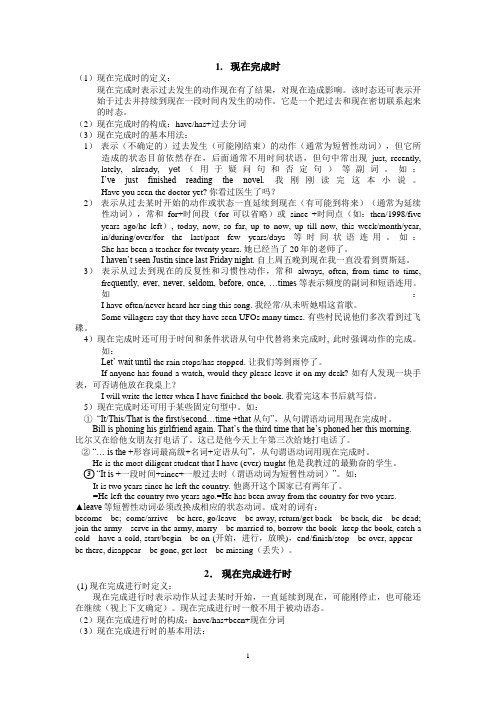
1.现在完成时(1)现在完成时的定义:现在完成时表示过去发生的动作现在有了结果,对现在造成影响。
该时态还可表示开始于过去并持续到现在一段时间内发生的动作。
它是一个把过去和现在密切联系起来的时态。
(2)现在完成时的构成:have/has+过去分词(3)现在完成时的基本用法:1)表示(不确定的)过去发生(可能刚结束)的动作(通常为短暂性动词),但它所造成的状态目前依然存在,后面通常不用时间状语,但句中常出现just, recently, lately, already, yet(用于疑问句和否定句)等副词。
如:I’ve just finished reading the novel. 我刚刚读完这本小说。
Have you seen the doctor yet? 你看过医生了吗?2)表示从过去某时开始的动作或状态一直延续到现在(有可能到将来)(通常为延续性动词),常和for+时间段(for可以省略)或since +时间点(如:then/1998/five years ago/he left), today, now, so far, up to now, up till now, this week/month/year, in/during/over/for the last/past few years/days等时间状语连用。
如:She has been a teacher for twenty years. 她已经当了20年的老师了。
I haven’t seen Justin since last Friday night. 自上周五晚到现在我一直没看到贾斯廷。
3)表示从过去到现在的反复性和习惯性动作,常和always, often, from time to time, fre quently, ever, never, seldom, before, once, …times等表示频度的副词和短语连用。
现在完成时及现在完成进行时详细讲解及练习
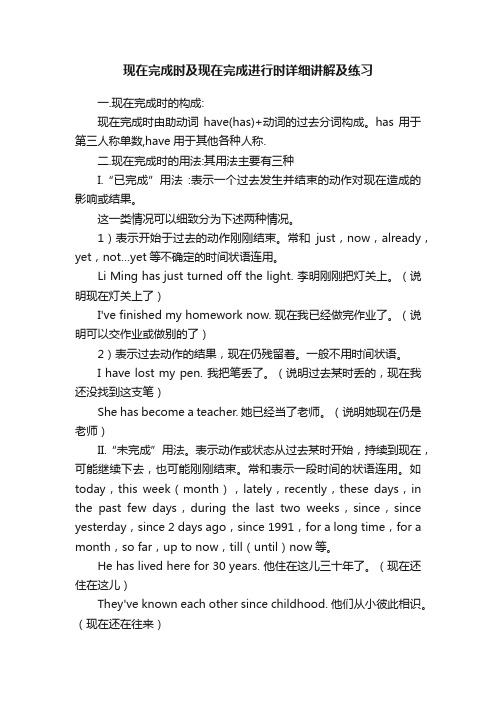
现在完成时及现在完成进行时详细讲解及练习一.现在完成时的构成:现在完成时由助动词have(has)+动词的过去分词构成。
has用于第三人称单数,have用于其他各种人称.二.现在完成时的用法:其用法主要有三种I.“已完成”用法:表示一个过去发生并结束的动作对现在造成的影响或结果。
这一类情况可以细致分为下述两种情况。
1)表示开始于过去的动作刚刚结束。
常和just,now,already,yet,not…yet等不确定的时间状语连用。
Li Ming has just turned off the light. 李明刚刚把灯关上。
(说明现在灯关上了)I've finished my homework now. 现在我已经做完作业了。
(说明可以交作业或做别的了)2)表示过去动作的结果,现在仍残留着。
一般不用时间状语。
I have lost my pen. 我把笔丢了。
(说明过去某时丢的,现在我还没找到这支笔)She has become a teacher. 她已经当了老师。
(说明她现在仍是老师)II.“未完成”用法。
表示动作或状态从过去某时开始,持续到现在,可能继续下去,也可能刚刚结束。
常和表示一段时间的状语连用。
如today,this week(month),lately,recently,these days,in the past few days,during the last two weeks,since,since yesterday,since 2 days ago,since 1991,for a long time,for a month,so far,up to now,till(until)now等。
He has lived here for 30 years. 他住在这儿三十年了。
(现在还住在这儿)They've known each other since childhood. 他们从小彼此相识。
(完整版word)英语现在完成时解题技巧(超强)及练习题(含答案)含答案解析

(完整版word)英语现在完成时解题技巧(超强)及练习题(含答案)含答案解析一、初中英语现在完成时1.—Where is your mother?—She ______ Australia and she ______ Sydney for two weeks.A. has been to; has been inB. has been to; has been toC. has gone to; has been inD. has gone to; has been to【答案】C【解析】【分析】句意:——你的妈妈在哪里?——她去了澳大利亚,她在悉尼呆了两周了。
has been to”去过某地“,现在已经回来了;has gone to”去了某地“,还没有回来;has been in”待在某地“一段时间。
根据句意Where is your mother?可知,她的妈妈还没有回来,第二个空后面有一段时间for two weeks,应该用be in,故应选C。
【点评】考查动词的时态,以及has been to ,has gone to ,has been in的含义和用法。
2.—Do you still play basketball?—Oh, no. I ____ it for the past two years.A. haven't playedB. didn't playC. won't playD. hadn't played【答案】A【解析】【分析】句意:——你还打篮球吗?——哦,不了。
我已经有两年没有打过了。
根据句中的for the last two years可知应与完成时态连用,又有时间是the last two years可知是从现在往前两年,因此应使用现在完成时态,故选A。
【点评】考查动词时态中的for+段时间与完成时态连用,根据时间确定是现在完成还是过去完成。
(完整版word)英语现在完成时的用法大全附答案

(完整版word)英语现在完成时的用法大全附答案一、初中英语现在完成时1.My parents for twenty years by the time I was 15.A. marriedB. had marriedC. had been marriedD. had got married【答案】 C【解析】【分析】for twenty years“二十年”.为表一段时间的状语,要求谓语动词具有持续性。
而在所给选项中,只有be married表示结婚状态,具有延续性,故选C。
【点评】本题考查非延续性动词与延续性动词的转换。
2.I ________ an invitation to the concert. I can't wait to go.A. receiveB. will receiveC. was receivingD. have received【答案】D【解析】【分析】句意:我已经收到音乐会的邀请,我等不及要去了。
由句意得知我已经收到去音乐会的邀请函,动作已完成造成的影响是我等不及要去,要用现在完成时,故答案选D。
【点评】考查动词时态。
根据题目所给语境推断出应使用的时态。
3.——Where is Mr. Wang?——He together with his students ________ Zhuyuwan Park.A. has gone toB. have gone toC. has been toD. have been to【答案】 A【解析】【分析】句意:—王老师在哪里?—他同他的学生去了Zhuyuwan公园。
A. has gone to去了,没在这里。
主语是单数;B. have gone to去了,没在这里。
主语是复数;C. has been to去过,没在那里;主语是单数;D. have been to去过,没在那里;主语是复数。
本句He是主语,together with his students是介词短语,做定语不是主语,所以用has。
(word版)现在完成时与现在完成进行时态讲解及练习(含答案),文档
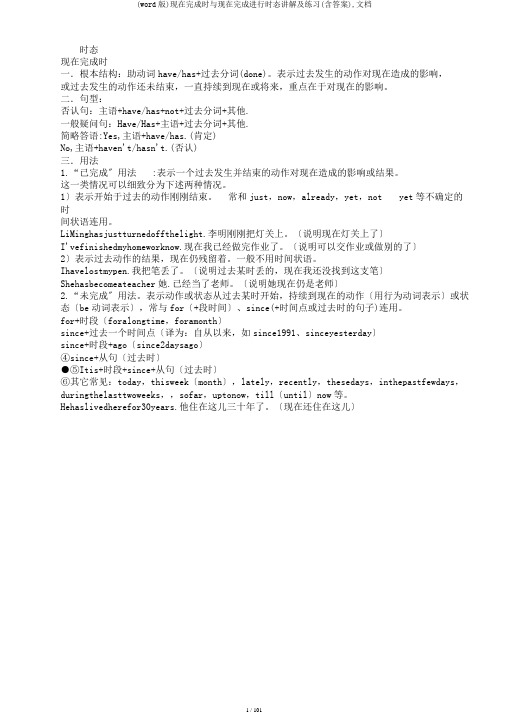
时态现在完成时一.根本结构:助动词have/has+过去分词(done)。
表示过去发生的动作对现在造成的影响,或过去发生的动作还未结束,一直持续到现在或将来,重点在于对现在的影响。
二.句型:否认句:主语+have/has+not+过去分词+其他.一般疑问句:Have/Has+主语+过去分词+其他.简略答语:Yes,主语+have/has.(肯定)No,主语+haven't/hasn't.(否认)三.用法1.“已完成〞用法:表示一个过去发生并结束的动作对现在造成的影响或结果。
这一类情况可以细致分为下述两种情况。
1〕表示开始于过去的动作刚刚结束。
常和just,now,already,yet,not yet等不确定的时间状语连用。
LiMinghasjustturnedoffthelight.李明刚刚把灯关上。
〔说明现在灯关上了〕I'vefinishedmyhomeworknow.现在我已经做完作业了。
〔说明可以交作业或做别的了〕2〕表示过去动作的结果,现在仍残留着。
一般不用时间状语。
Ihavelostmypen.我把笔丢了。
〔说明过去某时丢的,现在我还没找到这支笔〕Shehasbecomeateacher她.已经当了老师。
〔说明她现在仍是老师〕2.“未完成〞用法。
表示动作或状态从过去某时开始,持续到现在的动作〔用行为动词表示〕或状态〔be动词表示〕,常与for〔+段时间〕、since(+时间点或过去时的句子)连用。
for+时段〔foralongtime,foramonth〕since+过去一个时间点〔译为:自从以来,如since1991、sinceyesterday〕since+时段+ago〔since2daysago〕④since+从句〔过去时〕●⑤Itis+时段+since+从句〔过去时〕⑥其它常见:today,thisweek〔month〕,lately,recently,thesedays,inthepastfewdays,duringthelasttwoweeks,,sofar,uptonow,till〔until〕now等。
高中英语时态-现在完成进行时讲解及提升练习(有答案)
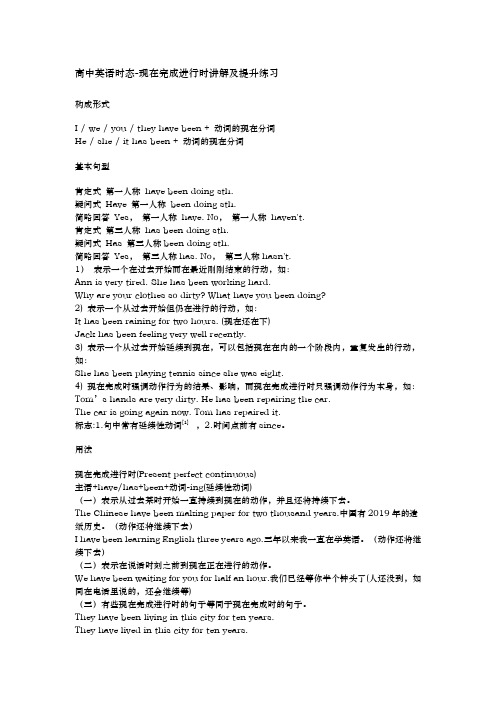
高中英语时态-现在完成进行时讲解及提升练习构成形式I / we / you / they have been + 动词的现在分词He / she / it has been + 动词的现在分词基本句型肯定式第一人称have been doing sth.疑问式Have 第一人称been doing sth.简略回答Yes,第一人称have. No,第一人称haven't.肯定式第三人称has been doing sth.疑问式Has 第三人称been doing sth.简略回答Yes,第三人称has. No,第三人称hasn't.1)表示一个在过去开始而在最近刚刚结束的行动,如:Ann is very tired. She has been working hard.Why are your clothes so dirty? What have you been doing?2) 表示一个从过去开始但仍在进行的行动,如:It has been raining for two hours. (现在还在下)Jack has been feeling very well recently.3) 表示一个从过去开始延续到现在,可以包括现在在内的一个阶段内,重复发生的行动,如:She has been playing tennis since she was eight.4) 现在完成时强调动作行为的结果、影响,而现在完成进行时只强调动作行为本身,如:Tom’s hands are very dirty. He has been repairing the car.The car is going again now. Tom has repaired it.标志:1.句中常有延续性动词[1],2.时间点前有since。
用法现在完成进行时(Present perfect continuous)主语+have/has+been+动词-ing(延续性动词)(一)表示从过去某时开始一直持续到现在的动作,并且还将持续下去。
(完整版)现在完成时讲解(含讲解及习题)(可编辑修改word版)

现在完成时讲解一、构成:肯定式:主语+ 助动词have/has + 动词的过去分词.疑问式:助动词Have/Has + 主语+ 动词的过去分词?否定式: 主语+ 助动词have/has + not + 动词的过去分词.过去分词规则变化:a)一般情况下,直接加ed, (work---worked,water---watered, finish---finished 等;)b)以“辅音字母+ y”结尾的动词, 把y 变成i 再加ed, (carry-- -carried study---studied 等;)c)以辅+元+辅结尾且中读的动词,要双写最后一个辅音字母,再加ed。
(stop---stopped,shop---shopped)d)以不发音的e 结尾的动词,只加d(过去分词不规则变化表:二、用法:用法一:表示过去(已经、曾经或从未)发生的某一动作对现在造成的影响或结果。
标志词:①already, ②never, ③ever, ④just, ⑤yet, ⑥before,⑦once/twice/数字+ times例:I have cleaned my room. 我已打扫了房间(房间现在是干净的,不需要打扫了)They have left. --他们已经离开了,也就是说现在他们人不在这里I have never had a car (我从未有过汽车。
)I have been there twice.a)already 往往用于肯定句,用在疑问句时表示强调或加强语气;yet 用于否定句和疑问句。
•He has already left here. 他已经离开这里了。
•Has he already left here? 他(真的)已经离开这里了吗?(表示加强语气)•My teachers haven’t had breakfast yet. 我的老师们还没有吃早饭。
•Have you written to your parents yet? 你已经给你父母写过信了吗?b)never 是否定词,表示“从来没有”,而ever 表示“曾经”•We have never been to the Great Wall. 我们从来没有去过长城。
2024版现在完成时与现在完成进行时完整版课件

题目2
I _______ (write) this letter since breakfast.
06
解析
现在完成进行时强调动作的持续性,表示“自 从早饭过后我一直在写这封信”。
改错题
01
题目1
I have finished to read the book.
02
答案
I have finished reading the book.
语境创设
通过创设不同的语境,体 会两种时态的使用场景和 表达效果,提高语言运用 的准确性。
练习巩固
通过大量的练习,熟练掌 握两种时态的构成和用法, 提高语言运用的熟练度。
相关资源推荐
教材教辅
01
推荐《英语语法大全》、《英语语法手册》等教材教辅,系统
学习英语语法知识。
在线课程
02
推荐Coursera、edX等在线课程平台上的英语语法课程,灵活
否定形式
主语 + have/has + not + 动词的过 去分词 + 其他成分
动词变化规则
规则动词变化
直接在动词后加-ed,如“play” 变为“played”。
不规则动词变化
需要单独记忆,如“go”变为 “gone”,“eat”变为“eaten” 等。
特殊动词变化
部分动词在过去分词形式上有特殊 变化,如“write”变为 “written”,“ride”变为 “ridden”等。
PART 05
练习题与答案解析
选择题
• 题目1:I ___my homework for two hours.
选择题
A. have finished
B. have been finishing
(完整版word)英语现在完成时X知识点总结及经典习题(含答案)含答案
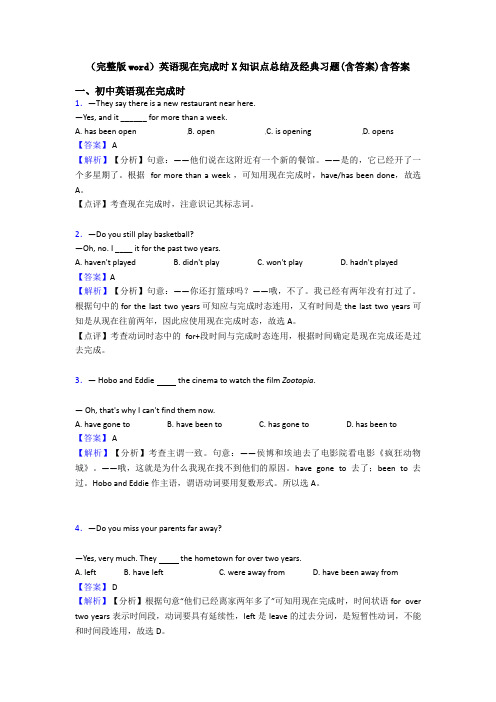
(完整版word)英语现在完成时X知识点总结及经典习题(含答案)含答案一、初中英语现在完成时1.—They say there is a new restaurant near here.—Yes, and it ______ for more than a week.A. has been openB. openC. is openingD. opens【答案】 A【解析】【分析】句意:——他们说在这附近有一个新的餐馆。
——是的,它已经开了一个多星期了。
根据 for more than a week ,可知用现在完成时,have/has been done,故选A。
【点评】考查现在完成时,注意识记其标志词。
2.—Do you still play basketball?—Oh, no. I ____ it for the past two years.A. haven't playedB. didn't playC. won't playD. hadn't played【答案】A【解析】【分析】句意:——你还打篮球吗?——哦,不了。
我已经有两年没有打过了。
根据句中的for the last two years可知应与完成时态连用,又有时间是the last two years可知是从现在往前两年,因此应使用现在完成时态,故选A。
【点评】考查动词时态中的for+段时间与完成时态连用,根据时间确定是现在完成还是过去完成。
3.— Hobo and Eddie the cinema to watch the film Zootopia.— Oh, that's why I can't find them now.A. have gone toB. have been toC. has gone toD. has been to【答案】 A【解析】【分析】考查主谓一致。
(完整版word)英语现在完成时训练题含答案

(完整版word)英语现在完成时训练题含答案一、初中英语现在完成时1.Nancy for five years.A. was dyingB. has diedC. diedD. has been dead【答案】 D【解析】【分析】句意:南西去世五年了。
A. was dying过去进行时态;B. has died现在完成时态;C. died一般过去时态; D. has been dead现在完成时态。
句子强调的是过去开始的动作或状态一直延续到现在,句子用现在完成时态;die是一个非延续性动词,不能与表示一段时间的状语for…连用,用成be dead。
故选D。
【点评】本题考查时态辨析。
某人去世了多少年就用延续性动词的现在完成时,has been dead。
2.Mike used to be a top student, but he behind since he lost himself in computer games.A. fellB. has fallenC. wasD. has been【答案】 D【解析】【分析】句意为“Mike过去是尖子生,但自从迷上电子游戏以来成绩落后了”。
由since可知but后的主句用现在完成时,瞬间动词fall不能和since引导的时间状语从句连用,故用延续性动词be。
故选D。
【点评】本题考查现在完成时中非延续性动词和延续性动词的转换。
3.Mr.Fan in 2005.In other words,he for 9 years till now.A. got married;has been marriedB. married;had been marriedC. got married;had been marriedD. married;got married【答案】 A【解析】【分析】首先第一空表述的是一个发生在2005年(即过去)的一个动作,所以为一般过去时,其次 married 后面要接宾语,get married 表示的是短暂性动作,所以应填get married. 第二空由“till now”可知表示的是从过去直到现在的一种状态即为现在完成时,此处married做形容词“已婚的”故填“has been married”,故选A.【点评】此题考查了动词时态问题,同时也考查了“get married”和“married ”的区别。
高中英语 现在完成进行时与现在完成时讲解及专项练习(有答案)
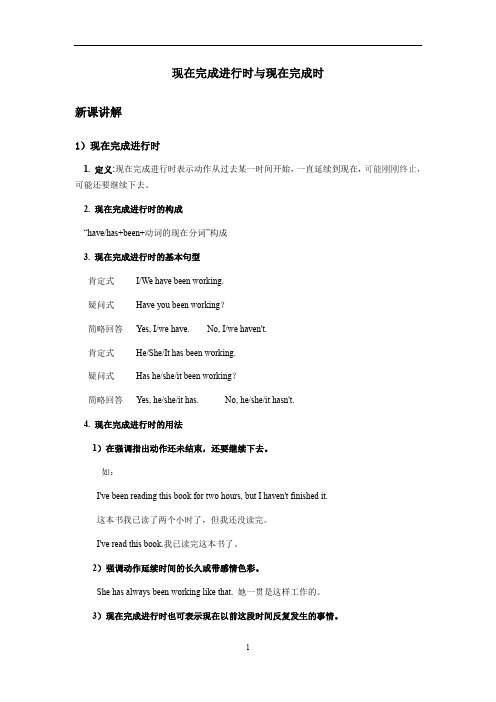
现在完成进行时与现在完成时新课讲解1)现在完成进行时1. 定义:现在完成进行时表示动作从过去某一时间开始,一直延续到现在,可能刚刚终止,可能还要继续下去。
2. 现在完成进行时的构成“have/has+been+动词的现在分词”构成3. 现在完成进行时的基本句型肯定式I/We have been working.疑问式Have you been working?简略回答Yes, I/we have. No, I/we haven't.肯定式He/She/It has been working.疑问式Has he/she/it been working?简略回答Yes, he/she/it has. No, he/she/it hasn't.4. 现在完成进行时的用法1)在强调指出动作还未结束,还要继续下去。
如:I've been reading this book for two hours, but I haven't finished it.这本书我已读了两个小时了,但我还没读完。
I've read this book.我已读完这本书了。
2)强调动作延续时间的长久或带感情色彩。
She has always been working like that. 她一贯是这样工作的。
3)现在完成进行时也可表示现在以前这段时间反复发生的事情。
We've been seeing quite a lot of each other recently. 最近我们经常见面。
4)现在完成进行时常与all day, all afternoon, for+一段时间(for seven hours, for four years)等连用如:I have been reading all afternoon. 我整个下午一直在读书。
【注意】1.有些表示状态,感情,感觉的动词如:have, exist, like., hate, hear, know, sound等动词不能用于现在完成进行时2.现在完成进行时没有否定式2)现在完成时1、含义:A.表示过去发生并且已经完成的动作对现在造成影响;He has finished his homework. (now he is free)B.表示从过去某一时间开始并一直持续到现在并且有可能还会持续的动作或状态. He has been a teacher for 3 years.2、结构:肯定句:主语+助动词have/has+ 过去分词(done)否定句:主语+助动词have/has not+ 过去分词(done)一般疑问句:Have/Has +主语+过去分词(done)(回答:Yes, 主语+have/has; No, 主语+haven't/hasn't)特殊疑问句:特殊疑问词+have/has+主语+done3、时间标志词:already, yet, so far, as yet, lately ,recently,these days/weeks/years, until now, up to now, since+ 时间点, for+时间段,always, in the last/past( few years)4、用法:A.已经完成的动作,强调对现在的影响。
现在完成时与现在完成进行时(完整版)2

无时间状语时
• 我最近在学英语 • 我最近在健身 • 我一直在看电影 • 我一直在等你
• 你最近在干什么 • 你最近都在见谁 • 你最近都在开哪辆车 • 你最近(做的)怎么样
• 你最近在学英语吗 • 你最近在健身吗 • 你一直在等我吗 • 你一直在看电影吗
我一直想见他 我一直想买辆车 我一直想告诉你
• 我刚学英语来着 • 我刚才在健身 • 我刚看电影来着 • 我刚才在等你
我没听到,我刚才在复习 我会了,我复习过了 我很累,我健身来着 我感觉很壮,我健过身了 我刚吃过,我现在不饿 我刚在吃饭,浑身是汗 我刚跑步来着,现在很累 我跑过步了,等会不用跑了 他刚才在修车,衣服很脏 他把车修了,车修好了
how do you do? how are you doing? how have you been doing?
how is everything? how has everything been ?
how is everything going? how has everything been going?
与现 进现doing
有时间状语时
all day、all night、all one's life、these days
• 他这几天一直在看电视 • 他整个上午一直在学习 • 这一辈子都在帮助别人 • 我今天一天都呆在家 • 他这个月都在玩游戏 • 我整个晚上都在做梦 • 我找了你一整个上午了 • 这雨已经下了一整天了
• 我最近经常见到他 • 我最近经常头痛 • 我最近经常做噩梦 • 我最近老梦到他 • 我最近经常买彩票 • 我最近老犯错 • 我最近吃的很多 • 他最近经常偷东西 • 他从5年前开始,一直在偷东西 • 我卖 已经卖了一年了 • 这话你都说了5年了
(完整版word)英语现在完成时完整归纳含答案解析
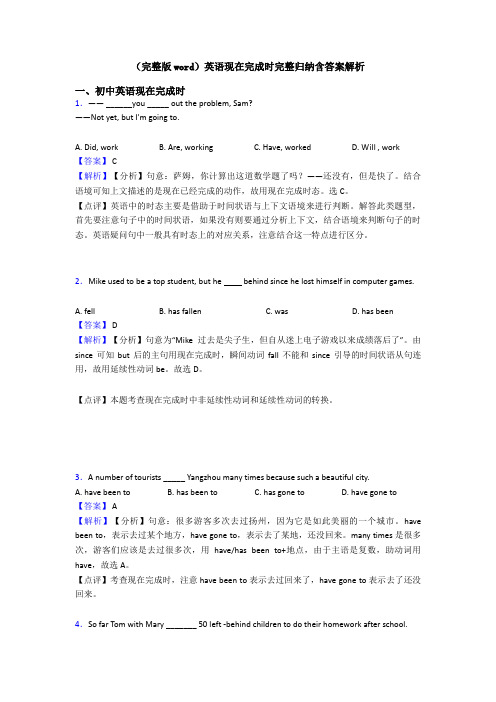
(完整版word)英语现在完成时完整归纳含答案解析一、初中英语现在完成时1.—— ______you _____ out the problem, Sam?——Not yet, but I'm going to.A. Did, workB. Are, workingC. Have, workedD. Will , work【答案】 C【解析】【分析】句意:萨姆,你计算出这道数学题了吗?——还没有,但是快了。
结合语境可知上文描述的是现在已经完成的动作,故用现在完成时态。
选C。
【点评】英语中的时态主要是借助于时间状语与上下文语境来进行判断。
解答此类题型,首先要注意句子中的时间状语,如果没有则要通过分析上下文,结合语境来判断句子的时态。
英语疑问句中一般具有时态上的对应关系,注意结合这一特点进行区分。
2.Mike used to be a top student, but he behind since he lost himself in computer games.A. fellB. has fallenC. wasD. has been【答案】 D【解析】【分析】句意为“Mike过去是尖子生,但自从迷上电子游戏以来成绩落后了”。
由since可知but后的主句用现在完成时,瞬间动词fall不能和since引导的时间状语从句连用,故用延续性动词be。
故选D。
【点评】本题考查现在完成时中非延续性动词和延续性动词的转换。
3.A number of tourists _____ Yangzhou many times because such a beautiful city.A. have been toB. has been toC. has gone toD. have gone to【答案】 A【解析】【分析】句意:很多游客多次去过扬州,因为它是如此美丽的一个城市。
have been to,表示去过某个地方,have gone to,表示去了某地,还没回来。
- 1、下载文档前请自行甄别文档内容的完整性,平台不提供额外的编辑、内容补充、找答案等附加服务。
- 2、"仅部分预览"的文档,不可在线预览部分如存在完整性等问题,可反馈申请退款(可完整预览的文档不适用该条件!)。
- 3、如文档侵犯您的权益,请联系客服反馈,我们会尽快为您处理(人工客服工作时间:9:00-18:30)。
时态现在完成时.基本结构:助动词have/has+过去分词(done)。
表示过去发生的动作对现在造成的影响,或过去发生的动作还未结束,一直持续到现在或将来,重点在于对现在的影响。
否定句:主语+have/has+not+过去分词+其他.一般疑问句:Have/Has+主语+过去分词+其他.简略答语:Yes,主语+ have/has.(肯定)No,主语+ have n't/has n't.否定)三.用法1.“已完成”用法:表示一个过去发生并结束的动作对现在造成的影响或结果。
这一类情况可以细致分为下述两种情况。
1)表示开始于过去的动作刚刚结束。
常和just, now, already, yet, not …yet等不确定的时间状语连用。
Li Mi ng has just turned off the light.李明刚刚把灯关上。
I've fini shed my homework now.现在我已经做完作业了。
(说明现在灯关上了)(说明可以交作业或做别的了)2)表示过去动作的结果,现在仍残留着。
一般不用时间状语。
I have lost my pen.我把笔丢了。
(说明过去某时丢的,现在我还没找到这支笔)She has become a teache她已经当了老师。
(说明她现在仍是老师)2.“未完成”用法。
表示动作或状态从过去某时开始,持续到现在的动作(用行为动词表示)或状态(be动词表示),常与for (+段时间)、since(+时间点或过去时的句子)连用。
①f o叶时段(for a long time, for a mon th)②s ince+过去一个时间点(译为:自从..... 以来,女口si nee 1991、si nee yesterday③ sin ce+时段+ago (since 2 days ago④since+从句(过去时)•⑤It is+时段+si nce+从句(过去时)⑥其它常见:today, this week (mon th), lately, rece ntly, these days in the p ast few days during the last two weeks,, so far, up to now, till (until) now 等。
He has lived here for 30 years他住在这儿三十年了。
(现在还住在这儿)They've known each other si nee childhood 他们从小彼此相识。
(现在还在往来)How long have you studied English?你学英语多久了?(现在仍在学)3. 经验性用法:表示从过去开始到目前为止这段时间中反复发生的动作或多次出现的状态。
常与频度副词女口 often, always, every week, twice 等连用。
I have bee n to the Summer P alace twice 我 曾经去过颐和园两次。
He has always said sc 他总是这么说.四.现在完成时的时间状语1.现在完成时的含义之一是过去完成的动作对现在仍有影响,用以下时间状语表示这种含 义。
a )用副词already 、yet 。
already 一般用于肯定句中,yet —般用于否定句和疑问句中。
女口: We have already finished our homework 我们已完成作业了。
They have n't fini shed their homework yet 他 们还没有完成作业。
用ever 和never 多用于否定或疑问句中,表示 曾经”或 从未 等。
-Have you ever been to the Great Wai 你曾经去过长城吗? -I have never been to the Great Wa 我从未去过长城。
用表示至U 说话为止的过去时间状语,女口 so far, just, before, up to now, the past few years等。
女口: I have seen her before, but I can not remember wher 我以前见过她,但记不起在哪里见过。
He has got to Beijing so far.到目前为止,他已经到了北京。
用包括 现在”在内的时间状语,如 now, today, this morning (month, year, term 等。
-Have you met him today?-No,I have n't.今天你见过他吗?我没有。
He has been there three times the last few day 近几天他去过那里三次了。
How many times have you been there this year 今年你去过那里多少次?2.短暂性动词不能和表一段时间的时间状语连用。
女口: come, go, arrive, reach, hear, close, leave, begi n, start, lose, buy, fall, joi n, die, get u|等。
但如果要保留表一段时间的时间状语,必 须将动词改为延续性动词,常与fo 叶时段、since+过去一个时间点(过去 从句)的时间状语 连用。
现归纳总结一下由非延续性动词到延续性动词的转换b) 如: c) d) 如: e) 如:表示动作发生的次数的时间状语borrow keep/have catch a cold ——have a cold put on ——wearb)用“be+形容词”代替短暂性动词return/come back/go bad — be back leave/move —beawaycome/arrive/reach/get here(there)——be here/there come/arrive/reach/get to ——be ind)用“ be+介词短语”代替短暂性动词go to/come to ——be in/at +地点 move to ——be in/at +地点如:He has been a soldier for three year 他参军三年了。
His father has bee n dead for two year 他 父亲去世二年了。
The film has bee n on for 5 mi nu tes 电影已开始五分钟了。
We have studied En glish for three years 我们(开始)学英语已三年了。
五.几点注意事项1. have been(to)与 have gone( to)的区别:____ have bee n(to)表示去过某地(现在已经回来了)”,可用于各人称; 可与once ,n ever,several times 等 连用。
have gone(to)表示去某地了(说话时某人不在当地)”,常用于第三人称,如:They have been to Beijing twice 他们去过北京两次。
He has gone to Beiji ng .他去北京了。
2.不可延续性动词现在完成时的否定式,已变成一种可以延续的状态,因此可以和表示 段时间的状语连用。
如:I have n't left here si nee 1997自从1997年以来,我一直没有离开过这儿。
(错)I have received his letter for a mon th.a)瞬间动词的变化 buy----have become ——bemarry ----- b e marriedfall(get) ill-----be ill die ——be deadfall(get) asleep ——be aslee p wake/wake up —be awakelose ---- b e missi ng/gon e/lost open ——be openfini sh( end ) be-overgo out ——be outc)用“be+副词”代替短暂性动词start/begin ——be on get up f be 」p join the army ——be in the armyclose ——be close(对)I have n't received his letter for almost a mon th.★ 练习、填空7、The Green Family moved to France two years ago.同义句转换)1 Have you ever(take) a trai n? 2 It(be ) more tha n three years since Jim (leave) here. 3 Have you (make)friends with your new classmates yet?(have) my lunch and rm not hungry now.5 Jim has n ever see n a panda. he?6 We(be) good friends since we met at schojl.(go) home.7 We can't find him any where. P erha ps he(read) the book befor 』.8 He 9 Mr. Green (teach) us a lot about socialstudiessince_September.10 I never ______ (meet) her sister before.11. He 12 He_________ (work) in our school for five year.(come) to our school last year/i n 2Oo8.13. They (cook) the supper already.14. They ________ 二、句型转(cook) the supper half an hour ago.1、 He has n ever cooked, (改成反意疑问句)2、 They have bee n here si nee 2000.(对划线部分提问)have they bee n here?3、 The old man last year. Hefor a year. (die)(动词填 空)4、This factory opened twenty years ago.同义句转换)This factory for twenty years.5、Miss Gao left an hour ago.(同义句转换)Miss Gao an hour .6、Her mother has been a Party member for three years(.同义句)Her mother the Party three years_________ two years ______________ t he Gree n family moved to Fran ce.8、The bus has arrived here. It arrived ten minutes ago 扌把两个句子合并成一个句子 ) 三、单项选择 Both his parents look sad .Maybe they ____________________________ what's happened to him . knew B . have known C . must know D .will know He has ______________ been to Shanghai , has he ?already B .never Have you met Mrjust B . ago 1、 A . 2、 A . 3、 A . 4、 The famous writer C .ever D . still Li ________ ? C .before D . a moment ago _ one new book in the p ast two year A . is writing B .was writing C .wrote D .has written 5、一Our country __ a lot—Yes A . hasC . has 6、 Zhao so far . .I hope it will be even changed ; well B . changed ; betterD . Lan a lready _ changed ; good cha nged ; better in this school for two years . B . will ; study D . are ; study ing girl . A . was ; studying C . has ; studied 7、 We __________ Xiao Li since she was a littleA . knowB . had knownC . have knownD . knew it twice .A . will seeB . have seenC . sawD .see 9、 —These farmers have been to the United States . —Really ? Whenthere ? A . will they go B . did they go C . do they goD . have they gone 10、 —— you your homework yet ? —Yes . I it a moment ago . A . Did ;do ;fini shed B . Have ; done ; fini shed 8、 Harry Potter is a very nice film .I C . 11、 A . 12、 ;done ; have father fini shed the PartyD . will ; do ; finish since 1978 . was in D . has been in A . 13、 Have His joined B . has joined C . —Do you know him well ?Sure .We ________________ f riends since ten years ago .were B . have been C . have become —How long have you ______________ here ?—About two mon ths . been B . gone C . come D .for ten has been on D . began left the army . wasA . 14、Hurry up! The play ______________________ A . has begunB . had begunC . ten years since he willD . 15、A . It isB . has D . have made arrived min utes .in the office . she ______________ to the library . C .will go D . has been Shandong for ten years .B . have been toD . have beenA. How soon, comesC. How long, came 20、 His uncle _____________ for A. has come hereC. has lived thereB. How often, got D. How far, arrivedmore tha n 9 years.B. has started to work D. has left the university4现在完成时的用法1)在强调动作还未结束,还要继续下去。
